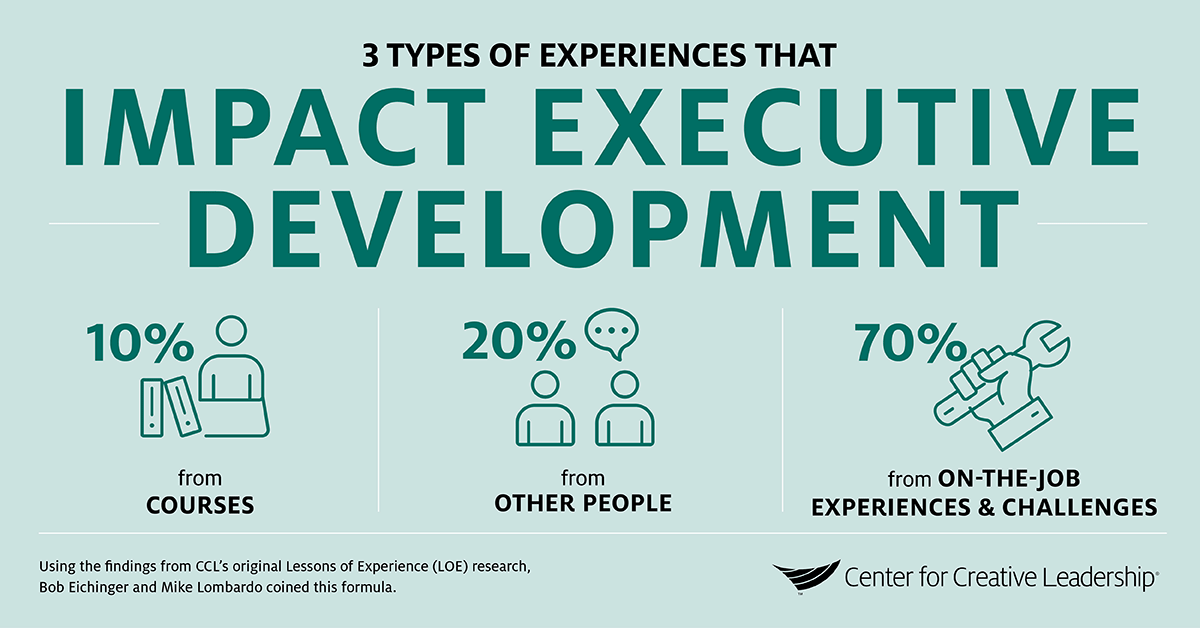What’s the 70-20-10 Framework?
A research-based, time-tested, classic guideline for developing managers, the 70-20-10 rule emerged from over 30 years of our Lessons of Experience research, which explores how executives learn, grow, and change over the course of their careers.
According to the 70-20-10 rule, leaders learn and grow from 3 types of experience, following a ratio of:
- 70% challenging experiences and assignments
- 20% developmental relationships
- 10% coursework and training
The underlying assumption of the 70-20-10 rule is that leadership can be learned — that leaders are made, not born.
We believe that today, more than ever, a manager’s ability and willingness to learn from experience is the foundation for leading with impact.
Go Beyond the 70-20-10 Rule With Experience-Driven Development
The 70-20-10 framework seems simple, but you need to take it a step further. All experiences aren’t created equal.
Which experiences contribute the most to learning and growth? And what specific leadership lessons can be learned from each experience?
To help you (and your boss or direct reports) match your learning needs to the experiences most likely to provide that learning, we’ve researched and mapped out the links between experiences and lessons learned.
We’ve studied on-the-job learning and experience-driven talent development extensively, and we even extended our long-standing findings (rooted in U.S.-based corporations) to a global audience. Our researchers collaborated with organizations in India, China, and Singapore to extend what we know about how leadership is learned.
Sources of Leadership Learning From Experiences
Our research across China, India, Singapore, and the U.S. has found that there are important similarities and differences in the way leadership is learned from experiences. But, from our studies of these 4 countries, 5 universally important sources of leadership learning stand out:
- Bosses and superiors
- Turnarounds
- Increases in job scope
- Horizontal moves
- New initiatives
Additionally, each respective country draws from 2 unique primary sources of leadership:
- China: personal experiences and mistakes
- India: personal experiences and crossing cultures
- Singapore: stakeholder engagements and crises
- United States: mistakes and ethical dilemmas
Among the leadership lessons learned from experiences, all 4 countries rank these 3 as universally important: managing direct reports, self-awareness, and executing effectively.
To adapt and grow, leaders need to be constantly involved in new experiences and challenges that foster learning. Some of these new opportunities will come their way through new jobs, crises, or significant challenges.
But it isn’t necessary to change jobs to find powerful learning experiences in the workplace. And in any job situation, leaders need to seek out or strengthen relationships with bosses, mentors, and peers that will contribute to their own growth in leadership.
At CCL, our work with the 70-20-10 framework rule reveals the power of putting experience at the center of talent management. It’s an approach that emphasizes the pivotal role of challenging assignments in attracting, developing, and retaining talent — and at the same time, highlights how the power of on-the-job experience is enhanced when surrounded by developmental relationships and formal learning opportunities.
In fact, our research on the 70-20-10 rule shows that challenging assignments are the primary source of key learning experiences in managerial careers.
The Amplifier Effect of the 10% for Coursework & Training in the Classic 70-20-10 Framework
What about coursework and training? Although it’s seen as contributing just 10% to a leader’s development, well-designed coursework and leadership training programs have an amplifier effect — clarifying, supporting, and boosting the other 90% of your learning. A program module that incorporates tools and experiential practice sessions can help managers become more effective learners and leaders.
The 70-20-10 rule reveals that individuals tend to learn 70% of their knowledge from challenging experiences and assignments, 20% from developmental relationships, and 10% from coursework and training. Skilled training specialists can help an organization establish a shared knowledge base and align its members with respect to a common leadership vision and the 70-20-10 rule.
Ready to Take the Next Step?
Build the most effective 10% possible for the coursework and training in your team’s 70-20-10. Partner with us to build critical leadership skills needed in your organization. Learn more about our Talent Development solutions.










